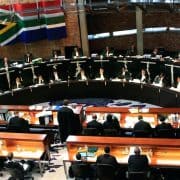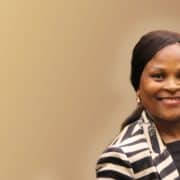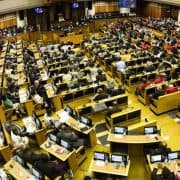|
Getting your Trinity Audio player ready...
|
Advocate Busisiwe Mkhwebane, an analyst at the State Security Agency, was yesterday selected by the parliamentary ad hoc committee in charge of appointing a new public protector, as the most suitable candidate to take over from Thuli Madonsela. Madonsela’s non-renewable seven-year term ends on 19 October 2016.
From the start Corruption Watch intended to ensure that the process was handled in a constitutional and transparent manner, so that the entire country could be satisfied that the final candidate got the job on merit and not for any other reason. This, we feel, we have achieved.
Mkhwebane was born in the town of Bethal in Mpumalanga. She passed her matric in 1988 at Mkhephuli Secondary School in Kwaggafontein, Pretoria. After that she attended the then University of the North (now the University of Limpopo) between 1989 and 1994, where she obtained a B Proc and LLB. She moved to the University of Johannesburg in 1997, where she obtained a diploma in corporate law and a higher diploma in tax law.
Mkhwebane obtained a Master of Business Leadership degree from the University of South Africa in 2010.
She is an advocate of the High Court. In the Department of Justice she held the positions of public prosecutor between 1994 and 1996 and legal administration officer between 1996 and 1998. Mkhwebane worked in the Office of the Public Protector from 1999 to 2005. During that time she was mainly a senior investigator but ultimately rose to the position of acting provincial head. Among her other achievements in that institution, she established the Gauteng office of the Public Protector, based at Constitution Hill.
In her other positions she has largely focused on immigration issues, with work experience in the Department of Home Affairs and the South African Embassy in China. Our background check revealed that Mkhwebane has seven active business interests and does not have any concerning risk indicators.
Among her skills and strengths, Mkhwebane listed business leadership, reporting, analysis, communication, negotiation, problem solving, relational building, and expertise in human rights law, including immigration and refugee law.
“I will be purely transparent in my dealings,” she said in her interview. “I’m apolitical and unbiased, therefore my judgments won’t be biased.”
Mkhwebane expressed clear ideas about carrying out her duties and helping to improve governance, should she be selected. “Given an opportunity to hold the position of public protector, I will assist all spheres of government to improve service delivery, assist in the implementation of the national anti-corruption strategy to eliminate corruption, assist in improving South Africa’s ranking in Transparency International’s Corruption Perceptions Index to below 50, as it is currently around 72 out of 177 countries, and introduce innovative ways to deliver services promptly within the metered resources.”
She also planned to focus on the speedy resolution of investigations and the monitoring of investigators in terms of their performance and agreed-upon service delivery indicators.
One of her big concerns is increasing access to the Public Protector’s services for all communities and persons, which could be achieved, she said, by extending the Public Protector into local district offices such as magistrates’ courts. Another innovative idea involved the use of local radio stations to reach out to people in outlying areas.
She also shared the goal of ensuring that the institution continues to strengthen democracy and assist the National Assembly so that citizens can enjoy good governance. “I want to create an environment where people are able to exercise their rights.”
Judith February, a senior research associate at the Institute of Security Studies, said in a radio interview yesterday that the ANC members of the panel were clearly backing Judge Siraj Desai out of the five final candidates, but there was no support for him from other parties. The ANC has pushed through decisions purely on strength of numbers before, she added, but today’s electoral landscape is somewhat different.
Rumours that Mkhwebane was the ANC’s favoured candidate have not been proven. “We need to give her the benefit of the doubt, but we hope that someone with a State Security background would not pivot towards secrecy – that might be a concern. However, she was an excellent, competent candidate.”
February mentioned the example of Chief Justice Mogoeng Mogoeng, who was initially thought by many to be unsuitable for the position and has since produced some brave pro-democracy judgments. “Strange things can happen when people have security of tenure, as the public protector does.”
Mkhwebane’s name will be now be put forward to the National Assembly and she must secure a 60% majority vote in order to proceed to the final step in the process, and that is the president’s signature. It is not clear, however, if the DA will take part in the vote as the party did not support Mkhwebane.








